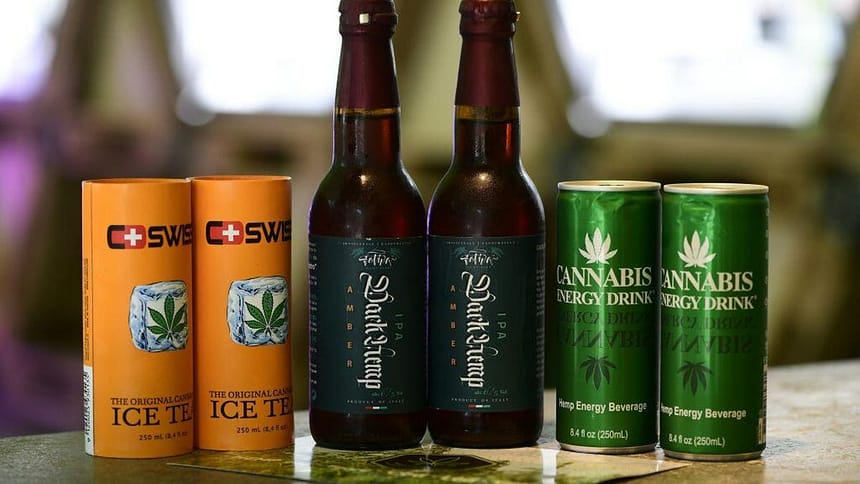This article is for informational purposes only and doesn’t constitute medical advice. Readers should talk to their doctor before trying THC products, especially if they’re taking certain medications or have underlying health conditions.
A month ago, I walked into Total Wine expecting to stare at thousands of bottles until someone asked if I needed help. What I didn’t expect was an entire aisle of THC-infused drinks. Just a year earlier, there was barely a shelf. Now, you can find cannabis beverages everywhere, even at your local brewery.
“There’s no shortage of options,” says Dr. Staci Gruber, director of the MIND Program at McLean Hospital and associate professor of psychiatry at Harvard Medical School. “We just need to do a better job explaining what they are and what they aren’t.”
As sobriety becomes cool again and concerns about the health impacts of alcohol rise, you might be curious about THC-infused swaps. But are they actually any healthier? Let’s find out.
What are THC drinks?
THC beverages are infused with tetrahydrocannabinol, the psychoactive compound in cannabis that causes a high and intoxication. These drinks come in a variety of forms, such as zero-calorie seltzers and tropical lemonades. They’re often marketed as a way to get a buzz without the booze. Some contain only THC, while others blend in cannabidiol, or CBD, a non-intoxicating compound, to help balance the effects.
How are THC beverages different from alcohol?
Alcohol — specifically ethanol — is a single molecule, not a mixture of many. After you learn your alcohol drinking habits, you typically know more about your limits. However, other ingredients like sugar and additives can impact your intoxication and hangovers. Also, they vary by person. While I might be buzzed after three alcoholic seltzers, my friend needs only one to feel the same way.
THC drinks are different. They come in many strengths and combinations, so predicting and standardizing the effects is harder.
“Cannabis is not one thing,” says Gruber. “A product that has equal amounts of THC and CBD is not likely to have the same impact as a product that has 15 milligrams of THC alone.”
Your body also processes THC differently. Alcohol goes into your bloodstream quickly through your stomach. THC takes longer to absorb. Once it reaches your liver, it becomes another compound that can feel even stronger.
“You may feel more high as time marches on. It’s the gift that keeps on giving,” says Gruber. Plus, once it’s in your system, you can’t get rid of it like you can with alcohol.
“You can always take more, but you can never take less. Once it’s in, you can’t throw it up or sweat it out,” Gruber says. “You’re stuck on the ride until it ends.”
That’s why she advises you to start low and go slow if you decide to try out cannabis drinks.
Are they legal?
It can depend on where you live, but most THC drinks you find in stores or online are made from hemp, not marijuana. Thanks to the 2018 Farm Bill, hemp-derived products (such as products with Delta-8 THC, created through a chemical conversion of CBD) are legal at the federal level if they contain no more than 0.3% of THC. With this rule, cannabis drinks can be sold in states where marijuana is still illegal.
“That’s how you can walk into a Total Wine and buy these off the shelf,” says Gruber. “It’s not part of the Controlled Substances Act.”
However, that doesn’t mean they’re available everywhere. Each state may have limits on how much THC a drink can contain or where it can be sold.
“Each state has varying regulations regarding cannabis-infused drinks,” says Dr. Doug Roehler, an epidemiologist at the National Center for Injury Prevention and Control. There’s no consistent national framework like there is with alcohol.
For example, Georgia is tightening restrictions on consumable hemp products. House Bill 265 proposes limiting THC and other intoxicating cannabinoids to 5 mg per serving. Meanwhile, the Department of Alcoholic Beverage Control in California banned hemp product sales in the same places as alcoholic beverages.
Not enough research on THC and CBD
Even though THC and CBD drinks are gaining popularity, the science behind them is still catching up. While alcohol has been studied for decades, there’s limited data on the long-term health effects of cannabis drinks. Unlike medications approved by the Food and Drug Administration, THC drinks are not evaluated for safety, effectiveness or consistency before hitting the market.
“I think we’ll have to stay tuned for the next decade or so to see what we can glean from these products,” says Gruber.
Part of the challenge is how THC beverages can vary in potency, cannabinoid content and added ingredients, like sugar. Until more research is available, experts recommend using caution, starting with low doses and waiting an hour or two before having a second cannabis drink.
Potential health benefits of CBD and THC
Even though we don’t know the exact health effects of THC drinks, some parts of cannabis have been studied for medical use. A 2017 study from the National Library of Medicine found evidence that cannabis can help with chronic pain, muscle spasms from multiple sclerosis and nausea caused by chemotherapy. These findings are based on cannabis in general rather than specifically beverages, but they show that certain cannabinoids may offer real benefits.
Many people reach for THC drinks as a way to cut back on alcohol. “Some people decide that they would like to drink less because we know there are significant health concerns with people who drink too much,” Gruber says. “The Surgeon General’s recent note on the association between alcohol use and cancer lit a fire under lots of people to not drink.”
The Surgeon General’s advisory linked alcohol consumption to an increased risk of seven types of cancer, including mouth, breast, liver and colon cancer. While the long-term effects of THC drinks are still unknown, the health risks of alcohol are well-researched.
Other nonalcoholic alternatives
“Mocktail” no longer means fruit juice or soda. Instead, bartenders at sober bars (and regular bars that have a dedicated nonalcoholic menu) put as much creative intention into mocktails as they do cocktails.
THC drinks aren’t the only option to turn to. You can find several other drinks to help you unwind and feel a little something special without the buzz or the high. Here are a few options to consider:
- Adaptogen drinks: These drinks use herbs and natural compounds (like ashwagandha, rhodiola or reishi mushrooms) that may help your body manage stress and support mental clarity. Some popular brands include Kin Euphorics, Recess and Hiyo.
- Mocktails: These are nonalcoholic cocktails designed to mimic the flavor and experience of traditional mixed drinks. They sometimes include functional ingredients for added benefits or use nonalcoholic spirits.
- Nonalcoholic dupes: These are drinks that look and taste like alcoholic beverages but without the alcohol. Companies such as Samuel Adams, Athletic Brewing and Corona offer the same flavor and feel as the original but without the same negative effects.
- Functional sparkling water: These drinks add ingredients like magnesium, electrolytes or calming botanicals to sparkling water to help ease stress and improve focus. Some popular brands include Good Idea and Soulboost.
The bottom line
THC drinks are becoming a popular alternative to alcohol. They’re showing up in liquor stores, bars and even breweries. While some people say these drinks help them relax without a hangover, experts say we still don’t know enough about their long-term health effects.
“If you’re interested in checking out THC-infused beverages, you should be mindful of what you’re buying and using,” says Gruber. “Start with a small amount and give yourself time to see how it affects you.”
The CDC also advises knowing how much THC is in the drink and not driving a vehicle or operating heavy machinery after having a glass.
When considering a THC drink, read the label, start slow and wait before going in for seconds. If cannabis beverages don’t feel like the right fit, there are plenty of other nonalcoholic options to help you unwind without the effects of alcohol or THC.




